Every year, the authoritative consulting firm We Are Social releases a comprehensive digital trends report, examining the digital usage patterns of countries worldwide through in-depth data research and analysis. The latest edition of “Digital 2024: Malaysia” has just been released! cacaFly Malaysia has compiled 9 key insights from the report to share with you. Let’s take a look together:
Malaysia’s Tech Wave: Embracing the Full Spectrum of Digital Innovation in 2024
In 2024, Malaysia’s digital landscape is witnessing remarkable trends. With smartphone penetration reaching 98.5%, up by 0.9% from last year, it reflects not only Malaysians’ continuous pursuit of digital technology but also their aspiration for a convenient lifestyle.
Moreover, the usage of laptops or desktops is on the rise, reaching 69.3%, up by 1.0% from last year. As for smartwatches or fitness bands, the usage rate has reached 33.1%, marking a 5.1% increase. Additionally, the adoption of TV streaming devices stands at 14.2%. These figures reflect Malaysians’ growing reliance on digital technology.
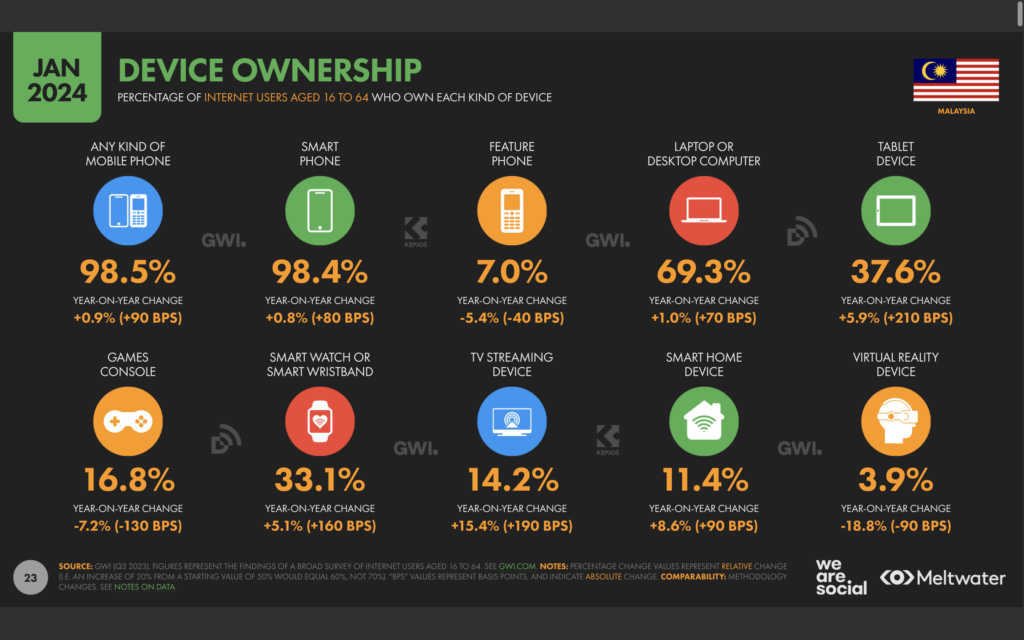
- Eight Hours Online Daily! The Era Dominated by Mobile Phones
According to the latest data, Malaysian users spend an average of 8 hours and 17 minutes online daily, with most of their time spent in the digital world. Among these, smartphones have become their most trusted devices, with an average usage time of 4 hours and 37 minutes, accounting for 55.8% of the total online time.
Even at home or in the office, people don’t forget to surf the internet on computers and tablets, with an average computer usage time of 3 hours and 40 minutes. These data reflect that in the digital landscape, the mobile device experience is more important than desktop web browsing.
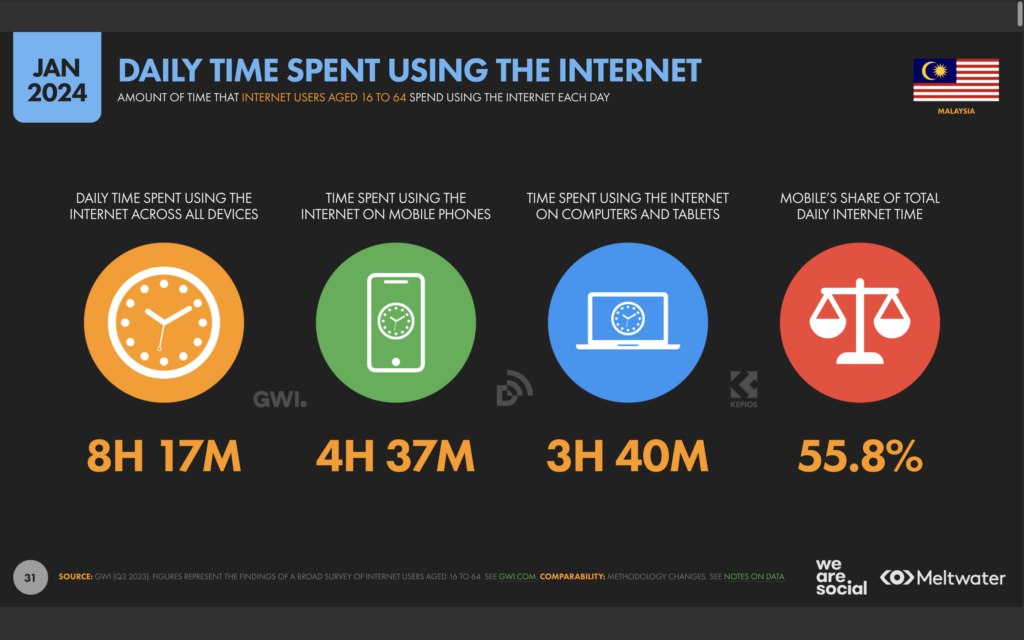
2. Digital Exploration: The Diverse Online World of Malaysian Netizens
As digital trends continue to evolve, the online behaviours of Malaysian netizens also exhibit diverse characteristics. Data from 2024 shows that 78.3% of people primarily go online to search for information, while 68.3% do so to stay updated on news and events, and another 68.2% use the internet to stay connected with friends and family. People are not only users of the internet but also seekers and disseminators of information.
Furthermore, 58.7% of Malaysian netizens actively utilise the internet to conduct research on products and brands, exploring new territories. In the realm of travel, 51.8% of individuals use the internet to search for destinations, vacations, and travel-related information. Simultaneously, 47.7% manage finances and savings online, demonstrating a sustained interest in digital financial management and investment. These data not only reveal the diverse online behaviours of Malaysian netizens but also herald a new chapter in the digital age’s future.
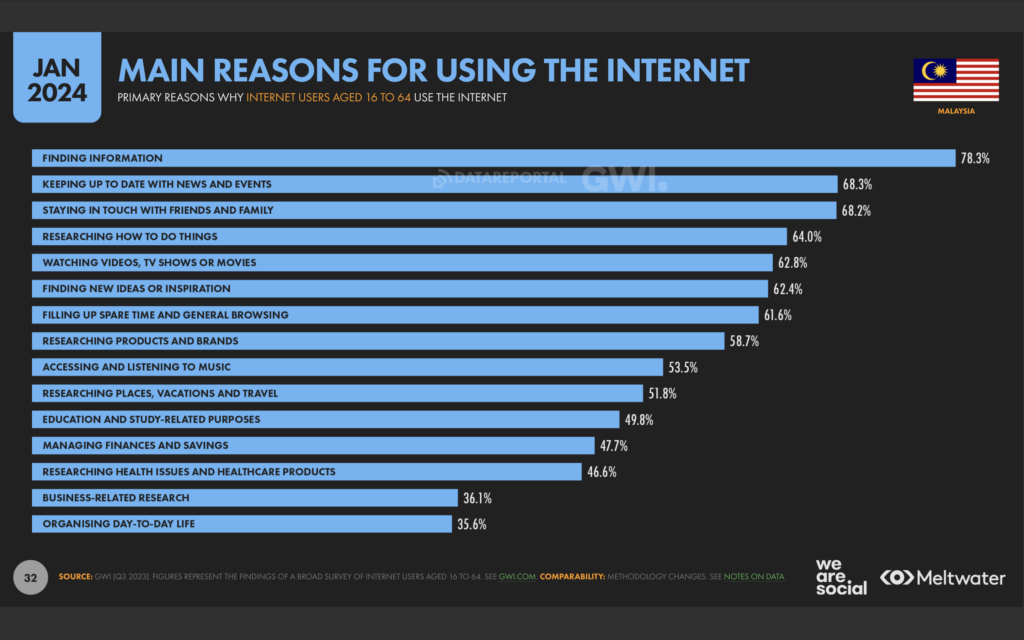
3. Rise of Audiovisual Content: Streaming Platforms Go Mainstream
Malaysian netizens are avid consumers of various forms of audiovisual content. According to surveys, 97.6% of netizens watch television every month, spending an average of 2 hours and 51 minutes per day. Compared to the previous year, there has been a 0.5% decline in the proportion of netizens watching television, with a 9.4% decrease in daily viewing time. The rise of streaming platforms is cited as the primary reason for the reduction in television viewing time. The report indicates that 95.3% of netizens use streaming platforms when watching television, spending an average of 1 hour and 17 minutes per day consuming streaming content.
The prevalence of streaming platforms presents new opportunities for brand marketing. Brands can reach a wide audience by advertising on streaming platforms. Additionally, brands can create their own audiovisual content to be showcased on streaming platforms, thereby enhancing brand visibility and influence.
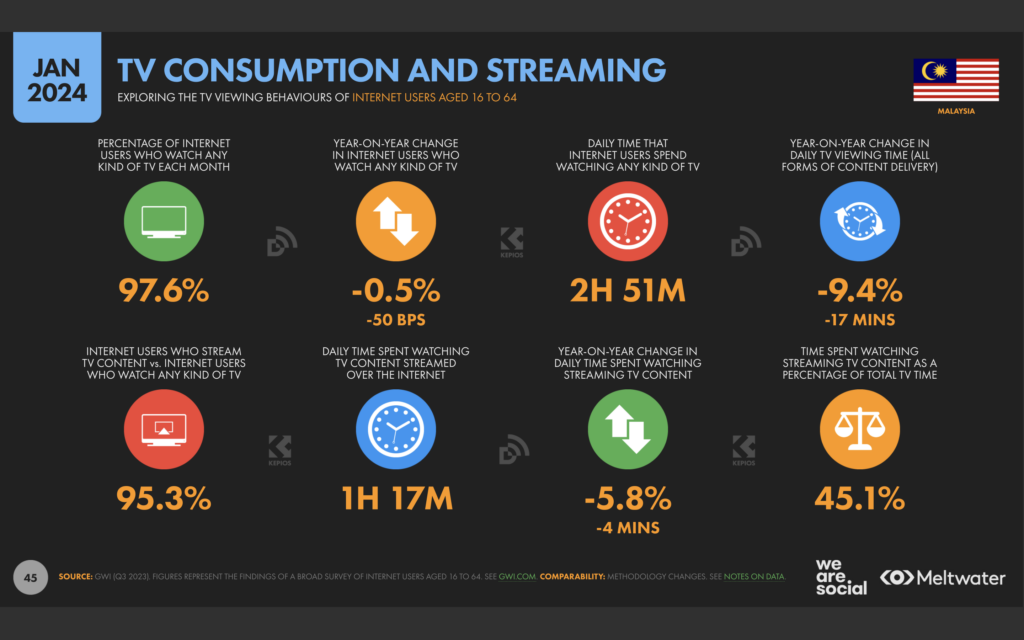
4. Browser Market Landscape: Chrome Still Dominate
When it comes to browsing the web, Chrome remains the most popular browser in Malaysia, but its dominance seems to be waning. This year, Chrome’s market share has slightly decreased from 71.74% to 70.3%. On the other hand, Safari has seen an increase in market share from 17.95% to 19.3%. Other browsers like Edge (2.7%), Firefox (2.5%), and Samsung Internet (2.2%) have also nibbled away at Chrome’s market share.
The data indicates a shifting landscape in Malaysia’s browser market. While Chrome maintains its lead, other browsers are making efforts to capture more market share, narrowing its advantage.
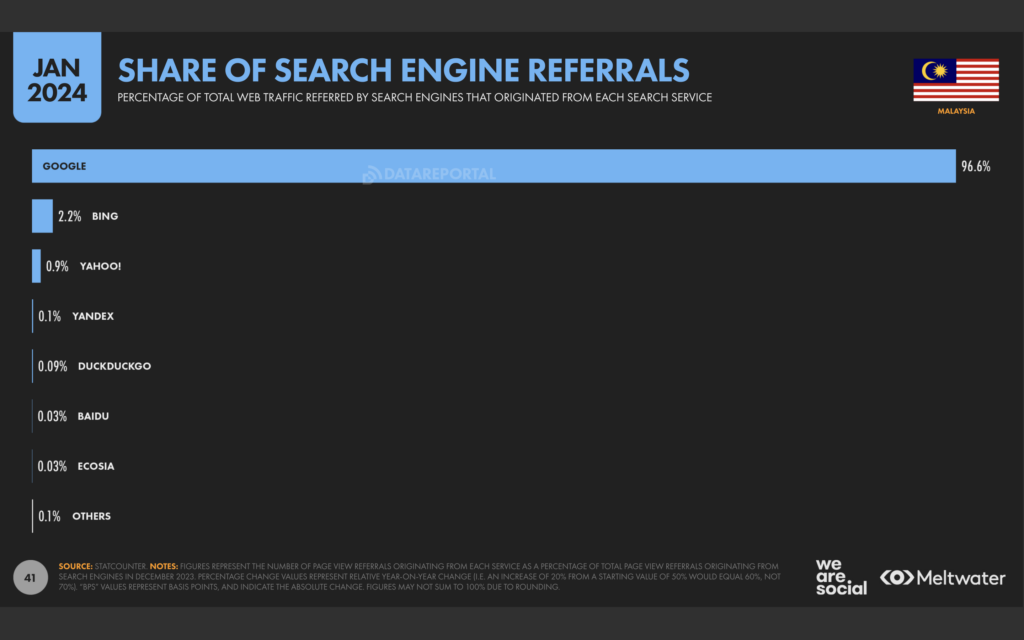
5. Analysis of Malaysian Internet Preferences: Google Maintains the Lead, YouTube and Facebook Follow Closely
According to data from Similarweb, the websites frequented by Malaysian internet users in 2024 are primarily Google.com, YouTube.com, and Facebook.com. While Google.com continues to hold the top spot, the traffic to YouTube.com and Facebook.com remains stable. Additionally, Instagram has seen a rise in its ranking this year, replacing Shopee, indicating the significance of social media in the lives of Malaysian internet users. These insights provide guidance for marketing decision-makers, suggesting an increase in advertising efforts on search engines and social media platforms to better reach target audiences and enhance brand exposure.
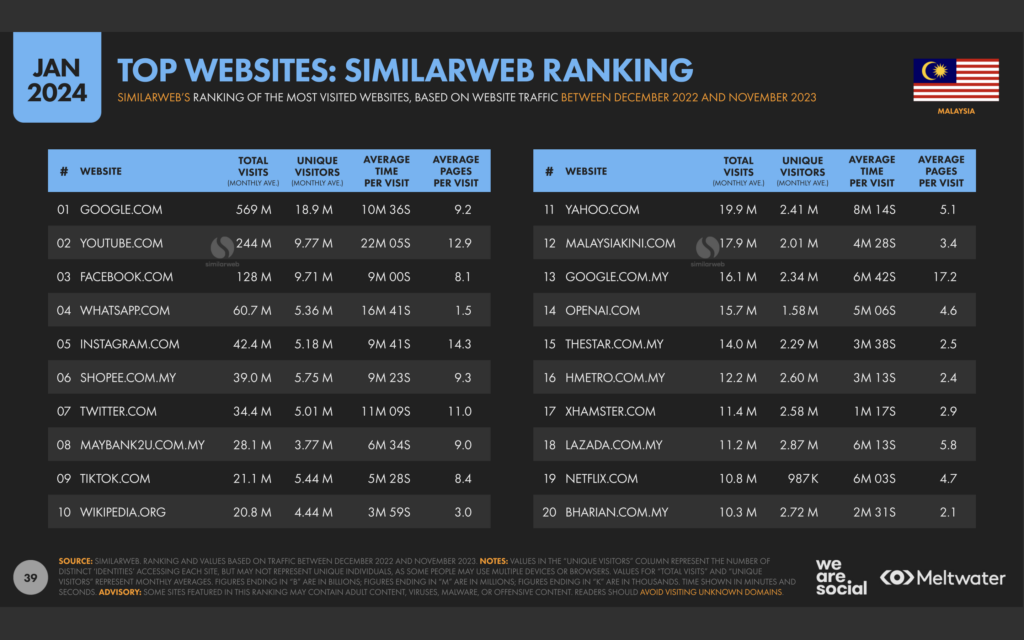
6. Social Media Craze: WhatsApp Leads the Way, TikTok Continues Rapid Growth
In 2024, the usage behavior of social media in Malaysia exhibits diverse characteristics. According to statistics, approximately 28.68 million people are active on social media, representing an increase of 4.8 million people between 2023 and 2024, with a growth rate of 20%. The prevalence of social media in Malaysia has reached 83.1% of the total population.
Among the most popular social media platforms in Malaysia, WhatsApp takes the lead with 90.7%, followed by Facebook (84.9%), Instagram (77.0%), TikTok (68.8%), and Telegram (64.9%). WhatsApp, as one of the most popular communication applications, has become Malaysians’ top choice for communication. Facebook and Instagram still maintain a wide user base in Malaysia, while TikTok, as an emerging short video platform, rising from fifth to fourth place, surpassing Telegram. Its user base grow by 8.9% compared to last year. These insights provide important references for marketing decision-makers. Brands can engage with existing customers and build customer loyalty through WhatsApp, Facebook, and Instagram, while also leveraging these platforms to explore potential customers externally.
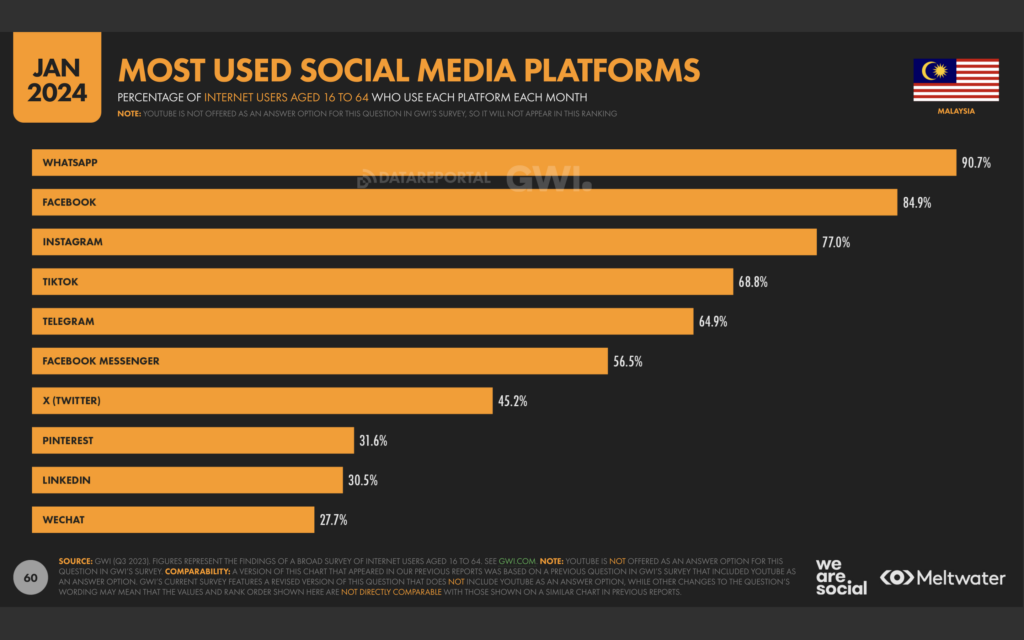
7. Online shopping is a trend! While attracting foot traffic with discounts, it’s also essential to optimize the customer shopping journey to truly retain customers!
In 2024, Malaysian netizens fully embraced the trend of online shopping, with 61.9% of people having experience with online purchases. Every week, approximately 27.2% of people order daily necessities through online stores, while 13.6% prefer to search for second-hand goods online. Additionally, 22.2% of consumers utilise online price comparison services to ensure the best deals. With the emergence of the “buy now, pay later” mechanism, 11.1% of users have begun to try this convenient payment method.
Among the factors influencing online purchases, free delivery remains the biggest attraction, with a staggering 64.8% of people stating it as their main reason for choosing online shopping. Following closely is discount offers, which attract 51.2% of consumers. Customer reviews and loyalty points also play significant roles, attracting 43.3% and 40.4% of users, respectively. Simple online checkout, next-day delivery services, easy return policies, and more can also enhance the online shopping experience. For e-commerce brands and sellers looking to effectively boost sales, leveraging these enticing offers and services is key!
Furthermore, apart from enticing customers with incentives, analysing the customer’s shopping journey on the website is crucial! Through Google Analytics (GA4), you can track all customer behaviours on the website, understand which pages are effective, and identify where customers drop off. With these insights, you can make corresponding optimizations! If you want to learn more about GA3 backups and GA4 integration, feel free to contact cacaFly Malaysia.
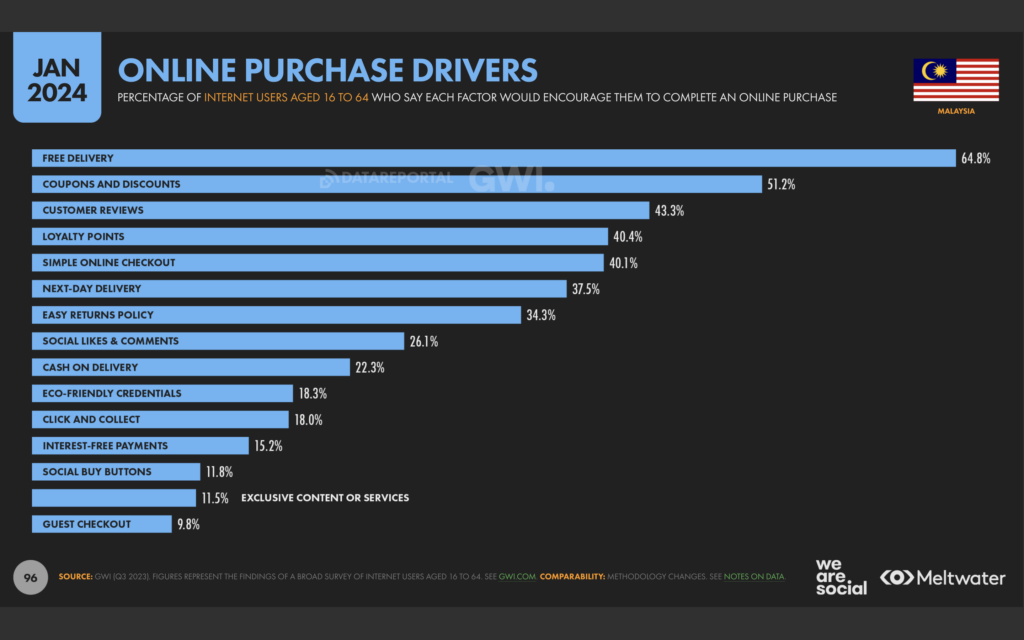
8. Changing Consumer Habits in Brand Discovery: Keywords Determine Brand Visibility!
The key to brand marketing lies in how audiences access brand information. Data reveals that Malaysian consumers primarily discover brand information through social media ads (40.1%), search engines (37.1%), retail websites (34.2%), TV ads (30.3%), brand official websites (29.6%), and word-of-mouth recommendations (29.5%). It’s noteworthy that social media ads have risen from the second position last year to the top spot, with their share increasing from 35.3% to 40.1%, becoming the preferred way to discover brand information.
Moreover, consumer engagement in digital marketing is increasing. Data shows that 62.9% of consumers conduct online searches before making purchases, a 5.0% increase from last year. In the past 30 days, 51.3% of internet users have visited at least one brand’s official website through social media, a 2.0% increase from last year. These trends underscore the importance of keywords. Optimising keywords helps improve search engine ranking, further enhancing the likelihood of brand discovery by consumers! Therefore, brands should consider consumer search habits when exposing their content.
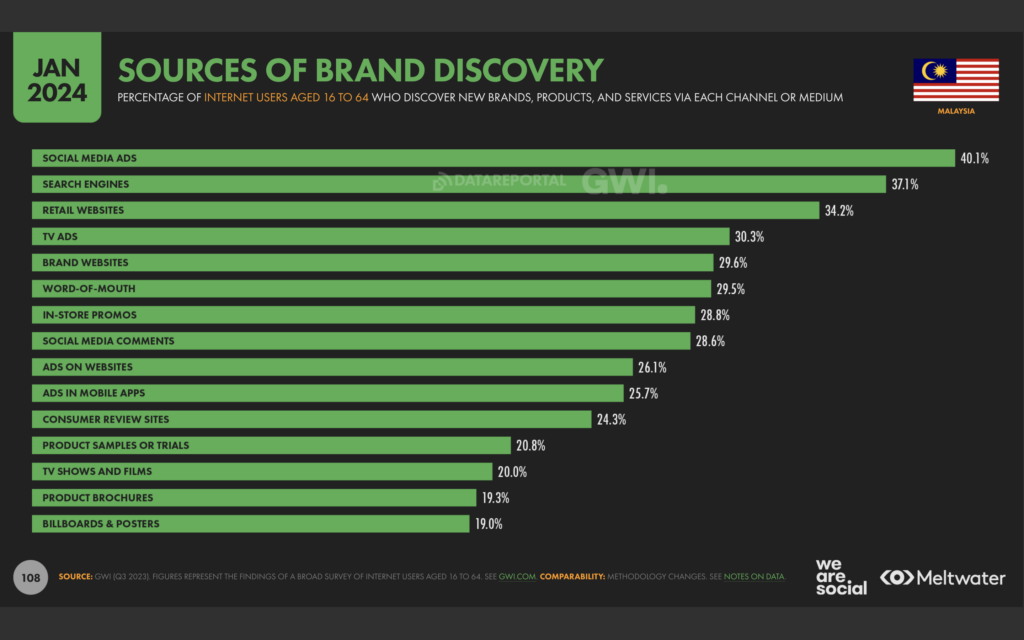
9. Rise in Consumer Privacy Awareness, First-Party Data Dominates the Market
In the digital age, people’s concerns about online privacy and security are growing. Data shows that 66.4% users are worried about distinguishing between true and false information online, while 39.9% users are concerned about how companies will use their online data. Furthermore, 38.3% users reject cookies on websites, 33.1% use tools to block internet ads, and 27.2% use virtual private networks (VPNs) to access the internet. These figures reflect a rising awareness of personal privacy and security, with cookies gradually phasing out. As third-party data diminishes, first-party data will dominate the market. Therefore, for brands, leveraging first-party data is crucial! Leveraging first-party data will help better understand and meet audience needs, enabling more effective marketing strategies.
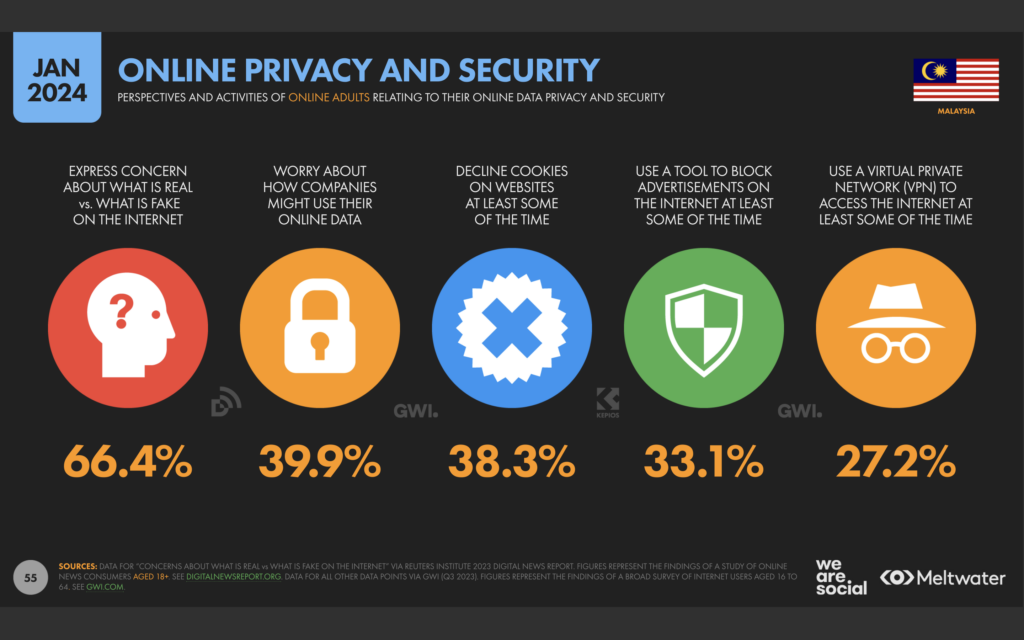
With the rapid evolution of the digital world, consumers’ preferences and needs are constantly evolving. Through annual updates in reports, marketers should keep pace with global changes, delve into the digital habits of Malaysian consumers, and provide powerful insights and guidance for marketing decisions. Let’s stay ahead of the trends, seize opportunities, and explore the endless possibilities of the digital age together!
►︎ In need of a fresh marketing strategy?
►︎ Contact us now! cacaFly’s professional consulting team is here to assist you.
PM: cacaFly Malaysia Facebook
Email: [email protected]
Mobile: 017-7486433
cacaFly Malaysia’s professional team consistently stays at the forefront of digital marketing, embracing a spirit of passion and integrity. We are committed to being the most reliable partner for our clients. Focused on providing end-to-end digital marketing services for both brand-oriented and performance-oriented clients, from initial research, mid-term advertising placement, MarTech applications, and content creation to later-stage data analysis and strategy optimization. We have assisted numerous brands and online stores in effectively improving performance and successfully expanding their online businesses. If you need advice on digital marketing strategy or advertising placement, contact our professional team now! You can PM cacaFly Malaysia on Facebook or email us at [email protected].





